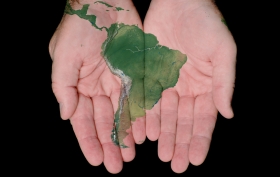Latin America Analysis: Environmental Policy and Deforestation

When it comes to the environment, there is no dialogue between civil society, the scientific community, government and parliament, says Carla Almeida.
In a year that was marked by bad news on the environmental front — the polar ice caps melting at an increasing rate, the decline in biodiversity, the failure to reach agreement on climate change, amongst other things — the release of data, at the end of 2012, showing a fall in deforestation in the Amazon, one of the most important biomes in the world, came as a relief.
According to estimates by the National Institute for Space Research
(INPE) — a Brazilian organization that conducts environmental
surveillance programs in the region — 4,600 km2 of jungle, in Brazilian
territory, were deforested between August 2011 and July 2012. This is a
drop of 27 per cent, compared with the same period, a year before.
These figures were revealed during the Climate Change Conference which
took place in Doha (Qatar), in November 2012, at which attention was
drawn to Brazil's efforts to fight climate change.
Brazil, where deforestation is seen as the main cause of carbon emissions, has set itself a voluntary goal to reduce illegal logging, annually, in the Amazon, to an annual maximum of 3,900 km2 by 2020. The latest figures would seem to indicate that the country is only four per cent shy of reaching its goal.
Celebrations, however, have been short-lived. The Amazon's monthly deforestation alert system is already showing a marked increase in the area cleared in the last five months of 2012.
According to data collected via satellite by the NGO Imazon, between August and December, 1,280 km2 of land were deforested. This is an increase of 127 per cent, compared with the same period in 2011.
What might be the explanation for such a radical change? Wouldn't this increase in deforestation be at odds with the country's commitment to climate change? Why is this concern for the environment, which is increasing in Brazil and other Latin American countries, and which is expressed through new environmental policies and growing social awareness, still not being translated into positive, sustained results?
Internal politics for external politics
If you only keep up with Brazil's role in international negotiations about the environment, news of the increase in deforestation in the Amazon might come as a surprise. However, for those following what has been going on in the area more closely, it will, perhaps, be less unexpected.
Whilst Brazil is busy creating a global image of a country that is heavily involved in the environment debate, domestically it is encouraging oil exploration, promoting a return to mining — even in the Amazon — resorting to hydroelectricity, and relaxing environmental legislation.
Of all these measures, one worth noting is the new forest code, enacted by President Dilma Rousseff in October 2012, after 13 years of debate in Parliament and three years of intense disputes between environmentalists, rural campaigners and the government.
The law, which in its previous incarnation dated back to 1965, regulates land use and establishes where indigenous vegetation should be preserved. Pressure from rural campaigners — a group with considerable political power in Brazil — led to it being modified so that it could, supposedly, be adapted to the new demands for productivity and competitiveness in the 21st century.
Drawn up by those whose main concern is agribusiness, with no input from the scientific community — and despite repeated offers, apparently to no avail, which would suggest certain technical inconsistencies in the proposal — nor from civil society, the law reduces the percentage of indigenous vegetation to be preserved on rural properties; ignores vegetation growing alongside intermittent watercourses; and changes the way fines resulting from the reclamation of damaged areas are charged.
Some important vetoes by the Brazilian president — such as prohibiting the replanting of exotic fruits and providing full amnesty for small producers who practised illegal deforestation before 2008 — have prevented the new law from becoming a true environmental disaster. However, rural campaigners with influence in Parliament are already mobilising around the regaining of ground lost in the dispute.
Continue Reading at SciDevNet
South America Hand Painting Via Shutterstock
©2013. Copyright Environmental News Network To subscribe or visit go to: http://www.enn.com